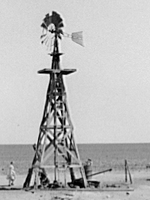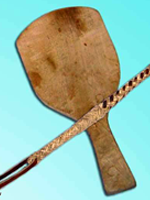
Sanders, Genevieve Beatrice LuceroAbout | Story: Dust Cloud Means Dinner Time | Abstract AboutConsultant recalls the POW internment camp located near the family home during World War II.
Story: Dust Cloud Means Dinner Time
Marcie Palmer: Can you tell us about a day's work on the ranch? You got up in the morning early. You did breakfast. Genevieve Sanders: Well, I got up early because they were already gone. They'd eaten and left at daybreak or before. MP: They always say they left before breakfast. GS: And it was still dark, night, for me, and I was scared to be there alone. So I certainly would get up. Well, I'd sweep that house. It was a big house with big rooms. You just sweep the dust out. We didn't have electricity, so we had to do it that way. Get that swept out and start my lunch. I didn't never knew what time they were gonna come home, and sometimes my food would be dry and I'd have to pour water in it and keep going a little. We had beans every day. We had vegetables that came out of cans. At this time we didn't have a refrigerator. We had a little north window where we kept our tea. Our tea would be very cool by the time they would come home to eat their lunch, or dinner, whatever it was. MP: Well, you mentioned you climbed up on the windmill to watch... GS: To see if they were coming, and of course, they were bringing one or two cows or three cows and that makes a lot of dust. And I would go clear to the top to look, and when I'd see that dust I knew they were on their way home. MP: So you headed for the kitchen. GS: Yes, I'd really get ready to feed them. Sometimes, I don't suppose it was very good because it kept just, you know, that's not good to do food that way, but I had to do it that way. I wanted to get it done and get it over with and have it there when they came. We had chili, and we had vegetables that came out of a can, and my husband would always come in and the fire would be just right. We had a pan about that big, square pan, and he'd make biscuit, full of biscuit. I could make tortillas, but I couldn't make enough at a time to feed them, you know. But we had a man, Juan Arenas, most of the time that we were living there, and he could make tortillas faster than anything. He always had coffee on the stove for us when we'd come in and those nice warm tortillas and sometimes fried potatoes. He loved to cook fried potatoes. That's where I learned to love fried potatoes. Abstract
Tape 1, Side A
Genevieve Beatrice Lucero Sanders was born in December 1910. The interview begins with a discussion of her family. Her maternal grandfather, Henry Joseph Cuniffee, came from Ireland at the age of fifteen. She briefly discusses the dates of birth of her siblings. The family ranched in the Tularosa Basin. During World War II the army took fifty-seven ranches in the area to form the White Sands Proving Range, and Mrs. Sanders' grandfather's was one of them. She discusses her mother's family comprised of six girls and two boys. The two sons went to fight in the Civil War and never came home. Genevieve attended school at South Ward Central and Union High in Las Cruces. She also attended the Loretta Academy for two years. She married Price Fontaine Sanders (nicknamed Sad) in 1930 and their son Phillip was born the following year out at the ranch in the Tularosa Basin. Her father's ranch was called the St. Nicolas Ranch. Her father, Felipe, and her Uncle Joe Lucero alternated between sheriff and deputy from one term to the next from the late 1890s into the 1930s (approximately thirty years).
Tape 1, Side B
She discusses St. Nicolas Ranch and remembers that her father had piped a spring down to the flats and that they were never without water. She describes it as "a lovely place." While many people bartered for groceries and necessary items, Mrs. Sanders remembers picking out the groceries they needed and charging them. Her father would come along and pay it later. She recalls dances, meetings, and skating that were held in the building known as "the rink." This building was located across the street from the old court house "where Court Junior High is." Mrs. Sanders briefly discusses her courtship and marriage to Price Fontaine Sanders. She was married to Price twice; once at the courthouse in Deming and once in the church, "because I'm a Catholic, and I just thought that I should marry by the church." Mrs. Sanders begins a short discussion of her uncle who was scalped by the Indians while with a wagon train delivering flour from the mill the family owned. "He lived two weeks." Mrs. Sanders gives information about her father's family. Her father's mother was Macedonia Trujillo and his father was Barbaro Lucero.
Tape 2, Side A
Mrs. Sanders begins a discussion of her parents. Her mother was born in 1874 and died in 1925. She discusses her father's ranch, St. Nicolas Ranch and describes how her father had cattle up on the San Andres range. Her father and her uncle ran the ranch together. When her uncle's heirs wanted to sell the ranch, Genevieve and her husband bought the ranch. She states, "I kept it because it was my father's." She recalls having "a lot of fun counting cattle." She shares stories about being on the ranch and many things that happened.
Tape 2, Side B
Mrs. Sanders recalls memories about prisoners of war (POWs) detained in New Mexico during World War II. She has some memories of the war and the POW camp near her home at that time. Mrs. Sanders mentions that she has two scythes and wonders if the Museum would be interested in them. She very briefly discusses the blowing sand and dust, and general information about the household chores. She recalls that her husband would "make biscuits." She relates an incident during WWII when a B-17 exploded. They reported it to the Army and went out to look at the wreckage. She recalls, "I still see those fellows that fell out of the plane.... They looked like they were sleeping. It didn't look ugly." |

